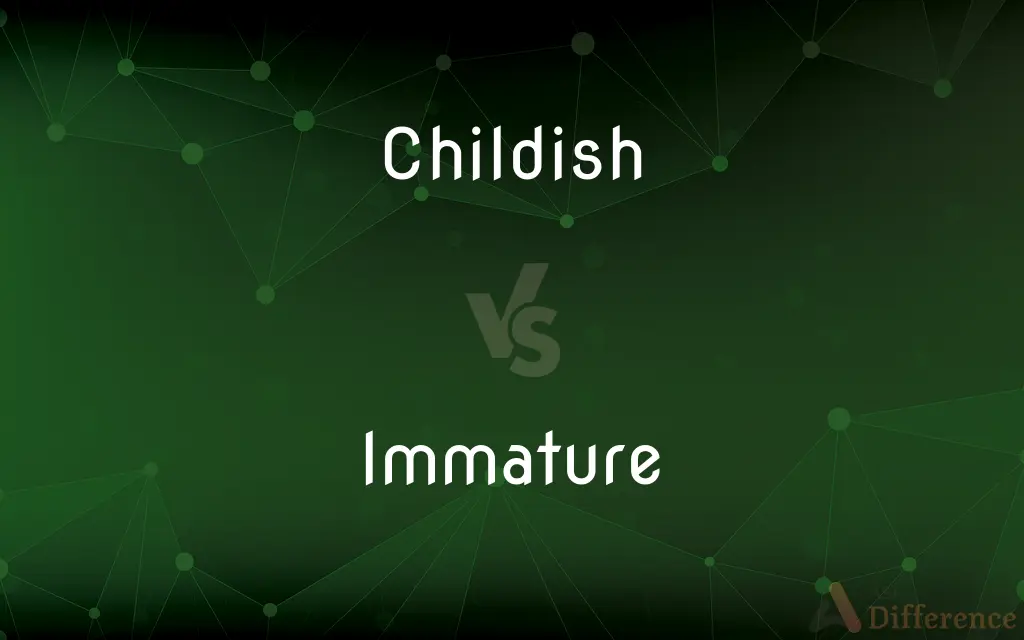Childish vs. Immature — What's the Difference?
Edited by Tayyaba Rehman — By Urooj Arif — Updated on April 2, 2024
Childish behavior mimics that of a child, reflecting innocence or naivety, while immature actions lack the expected development for one's age, often implying irresponsibility or lack of wisdom.

Difference Between Childish and Immature
Table of Contents
ADVERTISEMENT
Key Differences
Childishness often carries a connotation of innocence and simplicity, reminiscent of behaviors seen in children, such as playfulness or straightforwardness. Immaturity, however, is generally viewed in a negative light, suggesting a failure to act in accordance with one’s age or the expectations of society.
While childish behavior can be situational and sometimes appreciated for its innocence or humor, immaturity is often seen as a more pervasive trait that affects one's ability to function effectively in society. Immature individuals might struggle with tasks that require long-term planning, commitment, or empathy towards others, impacting their personal and professional relationships.
The distinction between being childish and immature is crucial in understanding the nature of someone's actions or demeanor. Childish behavior might be temporary and context-specific, often without malintent, whereas immaturity suggests a deeper lack of development that affects various aspects of an individual's life, including decision-making and interpersonal relationships.
Comparison Chart
Connotation
Often neutral or slightly positive, associated with innocence
Negative, implying a lack of expected development
Behavior Examples
Playfulness, simplicity, tantrums over minor issues
Emotional instability, irresponsibility, impulsiveness
ADVERTISEMENT
Context
Can be situational or temporary
A pervasive trait affecting various life aspects
Impact on Others
May be endearing or mildly annoying
Often leads to difficulties in relationships and responsibilities
Age Association
Mimics that of a child
Lacks the development expected for one’s age
Compare with Definitions
Childish
Reflects a stage of learning and development.
Childish curiosity about the world is a natural part of growth.
Immature
Exhibits a failure to take on responsibilities appropriate for one’s age.
Neglecting important duties for trivial pleasures is a sign of immaturity.
Childish
Childish behavior reflects the innocence or straightforwardness typical of children.
Laughing uncontrollably at simple jokes is considered childish.
Immature
Not limited to specific situations, affecting decision-making and social interactions.
Immaturity can hinder career progression and personal growth.
Childish
Actions are generally without malintent, often driven by genuine emotions.
A childish dispute over a game usually ends quickly and without resentment.
Immature
Often leads to difficulties in personal and professional relationships.
Immature individuals may struggle with maintaining stable relationships.
Childish
Often temporary, displayed during moments of joy or stress.
An young might display childish excitement when visiting an amusement park.
Immature
Immature behavior often indicates emotional instability or impulsiveness.
An immature reaction might involve storming out of a room during a disagreement.
Childish
Of, relating to, or suitable for a child or childhood
A high, childish voice.
Childish nightmares.
Immature
Involves impulsiveness and a lack of foresight.
Making decisions without considering the consequences is immature.
Childish
Marked by or indicating a lack of maturity; puerile
Tired of your childish pranks.
Immature
Not fully grown or developed
An immature plant.
Childish
Of or suitable for a child.
Immature
Marked by or suggesting a lack of normal maturity
Silly, immature behavior.
Childish
Immature in thought or behaviour.
Your childish temper tantrums are not going to change my decision on this matter.
Immature
An immature animal; a juvenile.
Childish
Of, pertaining to, befitting, or resembling, a child.
Immature
Occurring before the proper time; untimely, premature (especially of death).
Childish
Puerile; trifling; weak.
Methinks that simplicity in her countenance is rather childish than innocent.
Immature
Not fully formed or developed; not grown.
Childish
Indicating a lack of maturity;
Childish tantrums
Infantile behavior
Immature
Childish in behavior; juvenile.
You're only young once, but you can be immature the rest of your life.
The man was immature for throwing a tantrum.
Immature
An immature member of a species.
Immature
Not mature; unripe; not arrived at perfection of full development; crude; unfinished; as, immature fruit; immature character; immature plans.
Immature
Premature; untimely; too early; as, an immature death.
Immature
Characteristic of a lack of maturity;
Immature behavior
Immature
Lacking in development;
Immature plans
An unformed character
Immature
(used of living things especially persons) in an early period of life or development or growth;
Young people
Immature
Not fully developed or mature; not ripe;
Unripe fruit
Fried green tomatoes
Green wood
Immature
Not yet mature
Immature
(of birds) not yet having developed feathers;
A small unfledged sparrow on the window sill
Common Curiosities
Can immature behavior be changed?
Yes, with self-awareness and effort, individuals can develop more mature ways of handling emotions, responsibilities, and relationships.
Is being childish always negative?
Not necessarily. In some contexts, childishness can be endearing or reflect a desirable simplicity and innocence.
How can one differentiate between childish and immature behavior?
Childish behavior is often temporary and situation-specific, related to innocence, while immaturity is a pervasive trait affecting various aspects of life.
Is immaturity linked to age?
While immaturity is often associated with young age, it can be exhibited by individuals of any age, reflecting a lack of emotional or social development.
How does one address immaturity in themselves or others?
Through reflection, feedback, and sometimes professional guidance, individuals can work on developing more mature behaviors and emotional responses.
Why is maturity important?
Maturity is crucial for managing life's challenges, responsibilities, and relationships effectively, contributing to personal growth and societal harmony.
What role do upbringing and environment play in developing maturity?
They play a significant role, as exposure to diverse experiences, education, and supportive environments can foster emotional and social maturity.
How do childish and immature behaviors impact relationships?
Childish behavior might strain relationships if overdone, but it's generally less harmful than immature behavior, which can significantly disrupt personal and professional relationships.
Does society value childish qualities?
Society may value certain childish qualities, such as joy, curiosity, and simplicity, when balanced with maturity in decision-making and responsibilities.
Can someone be both childish and immature?
Yes, an individual can exhibit both traits, showing childish innocence in some situations and immature lack of responsibility or emotional control in others.
Is it wrong to exhibit childish behavior occasionally?
Not at all. Occasional childish behavior can be a healthy expression of joy and stress relief, as long as it's appropriate for the situation and balanced with maturity.
Can immaturity affect one's career?
Yes, immaturity can hinder professional relationships and progress, affecting one’s ability to take on responsibilities and work collaboratively.
How does culture influence perceptions of maturity?
Cultural norms and values significantly shape what behaviors are considered mature or immature, with variations in expectations across different societies.
Share Your Discovery

Previous Comparison
Combine vs. Mix
Next Comparison
Mast vs. SparAuthor Spotlight
Written by
Urooj ArifUrooj is a skilled content writer at Ask Difference, known for her exceptional ability to simplify complex topics into engaging and informative content. With a passion for research and a flair for clear, concise writing, she consistently delivers articles that resonate with our diverse audience.
Edited by
Tayyaba RehmanTayyaba Rehman is a distinguished writer, currently serving as a primary contributor to askdifference.com. As a researcher in semantics and etymology, Tayyaba's passion for the complexity of languages and their distinctions has found a perfect home on the platform. Tayyaba delves into the intricacies of language, distinguishing between commonly confused words and phrases, thereby providing clarity for readers worldwide.
















































